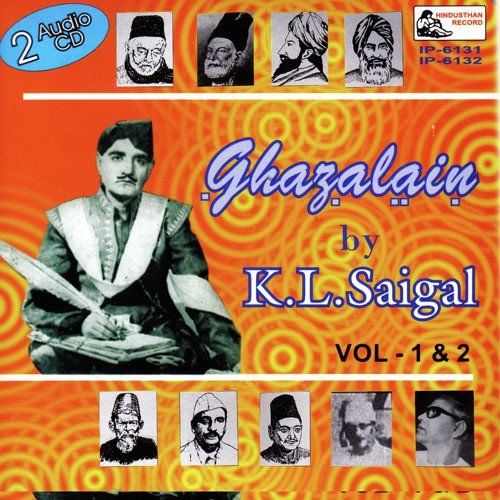
Album: Phir Mujhey Diday Tar
Singer: K.L.Saigal
Lyrics: Ghalib Khatoulvi
Label: Hindusthan
Released: 1934-01-01
Duration: 03:17
Downloads: 2911

Album: Phir Mujhey Diday Tar
Singer: K.L.Saigal
Lyrics: Ghalib Khatoulvi
Label: Hindusthan
Released: 1934-01-01
Duration: 03:17
Downloads: 2911
 Get This Song
Get This Song  Download in 320 kbps
Download in 320 kbps
Phir Mujhe Deeda-e-tar Yaad Aayaa Dil, Jigar, Tishnaa-e-faryaad Aayaa
I Remember Yet Once Again, My Eyes Had Cried
When You Had Left. Yet Once Again The Remembrance
Stirrs The Insatiable Yearning In My Heart And My
Being. Yet Once Again My Heart And My Being
Cry Out In Pain, Seeking Succor. Phir = Once
Again Mujhe = To Me Deed = Eye Tar
= Moist, Wet Deeda-e-tar = Eyes Wet With Tears
Yaad = Memory, Remembrance Aayaa = Came Dil =
Heart Tishnaa = Thirst, Yearning; Insatiable Thirst Faryaad =
Cry For Help, Complaint Dum Liyaa Thhaa Na Qayaamat
Ne Hanoz Phir Tera Waqt-e-safar Yaad Aayaa The Turmoil
In My Heart Had Hardly Settled Down, And Before
The Next Breath, I Remembered Yet Once Again, The
Moment When You Left To Go. A Very Deeply
Crafted Verse. Qayaamat Is Literally, The End Of Time,
The End Of Creation, When This Entire Creation (qaayenaat)
Will Cease To Be. As Per Quranic Teachings, All
Souls Will Be Resurrected On That Day. The Word
Itself, Representing An Event Of Such Magnitude, Has Over
Centuries Been Used By Poets And Writers To Represent
Calamitous Circumstances That Result In Violent Destruction And Turbulence,
Although That Is Not The Original Intent Of The
Meaning And Usage. The Word ′safar' Is The Name
Of The Second Month Of The Islamic Calendar, The
First One Being The Month Of Muharram. The Word
′muharram' Literally Means Forbidden. In The Month Of 'Muharram′,
All Unlawful Activities Are Forbidden, Especially Warfare And Shedding
Of Blood. The Original Literal Meaning Of Word ′safar'
Is Empty. During This Month, The Homes Became Empty
Of The Menfolk. The Ban On Warfare During The
Previous Month Of ′Muharram' Is Lifted, And The Menfolk
Leave Home And Proceed To The Battlefields. Once Again,
Over Centuries, The Word Has Become Associate More With
The 'act Of Proceeding (to Someplace)', Picking Up Connotations
Of Travel. The Use Of These Two Words In
This Verse Is Really Very Profoundly Linked With The
Poet′s State Of The Heart. The Separation Has Caused
A Calamity, A Tumultuous Disaster In His Heart. And
Just As He Is Getting Over This Turbulence, Yet
Again The Memories Of The Moment Of Her Departure
Come Back To Him. 'Safar′ Here Represents Proceeding Away
From The Heart, And Leaving An Empty Heart Behind.
Dum= Breath, Life, Moment Liyaa = Taken Thhaa =
Was Na = Not Qayaamat = Resurrection, The Last
Day, Day Of Reckoning; Also Disaster, Turmoil, Commotion Ne
= (preposition) Hanoz = Till Now, Yet; In Context
– Just Yet, Just Now Phir = Once Again
Tera = Yours Waqt = Time, Moment, Episode Safar
= Travel, To Go, To Leave; 'safar' Also Is
The Name Of The 2nd Month Of The Islamic
Hijri Calendar Waqt-e-safar = The Episode Of Starting To
Travel, The Moment Of (your) Leaving Yaad = Memory,
Remembrance Aayaa = Came Koi Veeraani Si Veeraani Hai
Dasht Ko Dekh Ke Ghar Yaad Aayaa Since You
Have Gone, The Loneliness In The Heart Is As
Extremely Lonely As Loneliness Itself. The Desert That I
Exist In Now, Tells Me Again Very Forcefully, Of
The Comfortable Times Spent With You. The Play On
Words In The First Line Is Superb. 'Koi Veeraani
Si Veeraani'. There Is No Words That The Poet
Is Able To Conjure Up To Describe Or Present
As A Similie To The Feeling Of Desolation And
Loneliness He Is Now Experiencing. The Desolation Is As
Desolate As Desolation Itself. That Is An Extreme Representation,
That Cannot Be Described In Any Other Words. The
Second Line Says That The Desolation Now Reminds Of
The Good Times Spent In Her Company. Another Interpretation
Is That Seeing The State Of Desolation Now, The
Mind Remembers With Regret The Earlier Times, Before This
Desolation; And The Poet Says He Should Not Have
Taken This Path In Life; I.e. Should Not Have
Involved Himself In Amorous Pursuits, The End Result Of
Which Is Loneliness Only. Veeraani = Desolation, Emptiness, Meaningless-ness
Si = Such As Hai = Is Dasht =
Desert, Forest; Far From Habitation Ko = (preposition) Dekh
= To See Ke = (presposition) Ghar = Home,
Residence, Abode Of Comfort Yaad = Memory, Remembrance Aayaa
= Came Mein Ne Majnu Pe Ladakpan Mein ′asad′
Sang Utthaayaa Thhaa Ke Sar Yaad Aayaa I Remember,
When I Was Younger, And Immature, I Was Part
Of The People Who Had Subjected Majnu To Beating
With Stones. Today I Find Myself In The Circumstances
Same As Majnu, And Remembrance Makes Me Think Of
Me Being Subjected To The Same Treatment. The Poet
Says, At One Time, He Used To Ridicule People
Who Would Be Crazy In Love. Today, He Finds
Himself In The Same Fanatical State. Mein = I,
Me Ne = (Preposition) Pe = On, To Mein
= In Sang = Stone Uthhaayaa = Picked Up
Thhaa = Was, Did Ke = (preposition) Yaad =
Memory, Remembrance Aayaa = Came